5 Essential Oils for Cuts and Abrasions
Cuts and abrasions are common injuries that can occur in our daily lives. Whether you’re an active individual who enjoys outdoor activities, or simply going about your day-to-day tasks, there’s always a chance of getting a minor cut or skin irritation.
While these injuries often heal on their own, treating them properly can reduce discomfort and speed up the healing process. Essential oils for cuts and abrasions, derived from plants, offer a natural and effective approach to wound care.
Understanding Cuts and Abrasions
Before we delve into the benefits of essential oils, it’s important to understand what cuts and abrasions are.
A cut is a skin wound with separation of the connective tissue elements. Unlike an abrasion, which is characterized by damage to the first layer of the skin (epidermis), a cut often goes deeper, reaching the dermis or even subcutaneous layers. Cuts can occur from sharp objects like knives, glass, or metal.
On the other hand, an abrasion occurs when the skin rubs or scrapes against a rough or hard surface, causing the topmost layer of the skin to get worn away. Common causes of abrasions include falls on the pavement or rug burns.

Why Choose Essential Oils?
Essential oils have been used for centuries in traditional medicine due to their potent medicinal and therapeutic properties alone. They contain compounds with strong antibacterial, antiviral, and anti-inflammatory properties, which can help accelerate wound healing and prevent infection.
Moreover, unlike synthetic medications, essential oils for cuts and abrasions rarely cause side effects when used correctly and can be a safer choice for people with sensitive skin or those who prefer natural remedies.
How to Use Essential Oils Safely on Cuts and Abrasions
Step 1: Choose the Right Essential Oil
Firstly, you need to choose the appropriate essential oil. Some of the most commonly used essential oils for minor cuts and abrasions are lavender, tea tree, chamomile, and helichrysum due to their antibacterial and healing properties^[1^].
Step 2: Clean the Wound
Before applying any essential oil, make sure to clean the wound thoroughly with warm water and mild soap. This helps to remove any dirt or bacteria that might be present.
Step 3: Dilute the Essential Oil
Never apply essential oils directly to the skin as they are highly concentrated and can cause irritation. Always dilute them in a carrier oil such as coconut, olive, or jojoba oil. A common ratio is 1-2 drops of essential oil to 1 teaspoon of carrier oil^[2^].
Step 4: Apply the Oil
Once your essential oil is properly diluted, you can apply it gently to the cut or abrasion using a cotton ball or swab. Be careful not to rub or press too hard as this could cause further damage or pain.
Step 5: Cover the Wound
After applying the oil, cover the wound with a clean bandage or dressing. This will help to keep the area clean and protect it from further injury.
Step 6: Monitor the Wound
Keep an eye on the wound over the next few days. If you notice any signs of infection such as redness, swelling, or increased pain, stop using the essential oil and seek medical attention.
Step 7: Repeat
You can reapply the diluted essential oil 2-3 times per day until the wound is fully healed.
Remember, essential oils should not be used as a substitute for professional medical advice. If the cut or abrasion is deep, won’t stop bleeding, or shows signs of infection, seek medical attention immediately.
Note: It’s important to do a patch test before using any essential oil to check for allergic reactions.
Apply a small amount of diluted essential oil on a patch of skin and wait for 24 hours to see if there’s any adverse reaction.
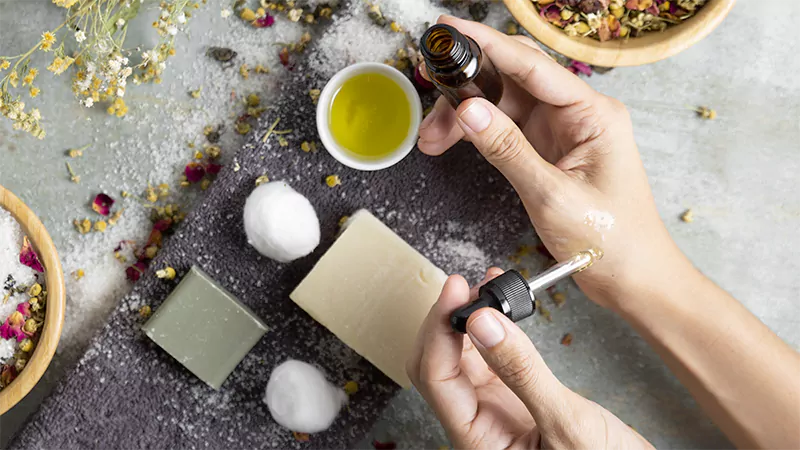
Discover the Healing Power of Essential Oils: Top 5 Picks for Cuts and Abrasions
When it comes to natural remedies for cuts and wounds, essential oils take center stage. These potent plant extracts harness the healing power of nature, offering a gentle yet effective way to care for minor skin injuries. Here are five of the best essential oils for cuts and abrasions.
Lavender Essential Oil: Lavender is renowned for its calming aroma and its ability to soothe the skin. This versatile oil is believed to speed up the healing by promoting cell regeneration and reducing inflammation. Lavender essential oil is also known for its antimicrobial properties, which can help prevent infection in a wound.
Rosemary Essential Oil: Rosemary oil is another powerful healer, sharing many of the same benefits as lavender. It’s particularly useful for deep cuts or wounds, thanks to its strong antiseptic qualities that can help keep infections at bay.
Tea Tree Essential Oil: Tea tree oil is a popular choice for wound care due to its potent antibacterial and antifungal properties. This makes it an excellent option for preventing infection in cuts and scrapes.
Helichrysum Essential Oil: Known for its anti-inflammatory, antifungal, and antibacterial properties, helichrysum essential oil can be a useful tool in healing skin damage. Its unique ability to reduce inflammation and promote cell regeneration can help accelerate the healing process of wounds.
Chamomile Essential Oil: Chamomile, much like lavender, is known for its soothing properties. It’s considered one of the safest and mildest oils to apply on open wounds. Its potent anti-inflammatory and antimicrobial properties can help speed up healing while reducing the risk of infection.
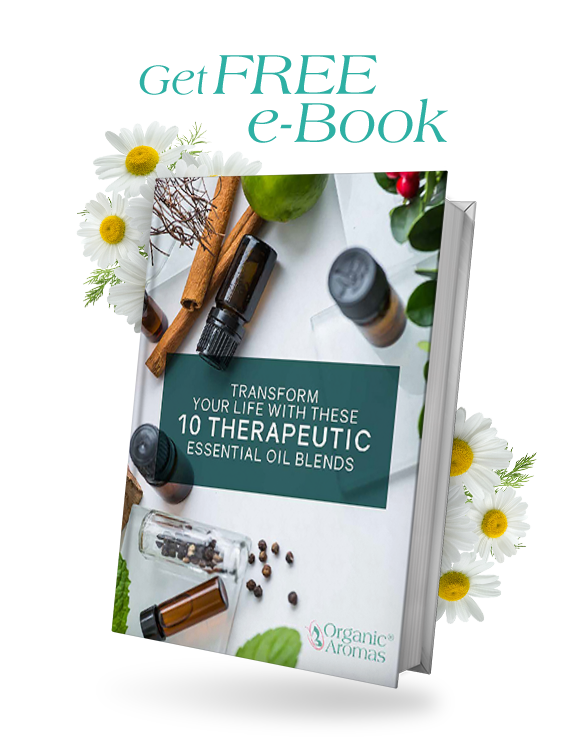
Sign Up to Get Your FREE Essential Oils e-Book Here
Other Good Essential Oils For Cuts and Abrasions
There are several other essential oils that can be beneficial for skin healing. Here’s an additional list of other oils:
Frankincense Essential Oil: Frankincense oil is known for its powerful anti-inflammatory properties and its ability to promote cell regeneration, making it a great choice for wound healing.
Myrrh Essential Oil: Myrrh has been used for centuries for its antiseptic and anti-inflammatory properties. It can help keep wounds clean and accelerate the healing process.
Geranium Essential Oil: Geranium essential oil is recognized for its ability to stop bleeding from cuts and abrasions. It also has antimicrobial properties that can help prevent infection.
Clove Essential Oil: Clove is a powerful antiseptic and has been used for years in dental care. Its antimicrobial and anti-inflammatory properties can aid in wound healing.
Eucalyptus Essential Oil: Eucalyptus oil’s antiseptic qualities make it a good option for cleaning and treating wounds, and preventing infection.
Peppermint Essential Oil: Peppermint oil is known for its cooling effect, which can help soothe a painful wound. It also has antimicrobial properties to help keep the wound clean.
Calendula Essential Oil: Calendula oil is often used in skincare for its soothing and healing properties. It can help reduce inflammation and speed up the healing of wounds.
Essential oils are potent and should always be diluted with a carrier oil before applying to the skin. An essential oil blend for cuts will also work better. Carriers such as coconut oil or sweet almond oil work extremely well for wounds.
Most essential oils named here blend well. Healing wounds has never been easier. A few drops in a suitable essential oil recipe will work to heal wounds well. The analgesic properties in these oils is soothing to skin. Lavender essential oil is a favorite. Tea tree oil is revered in this regard.
Consult with a healthcare professional or a certified aromatherapist before using essential oils for wound care, especially if you have sensitive skin or underlying health conditions.
Harness the power of these incredible essential oils to naturally support your body’s process of healing. Nature truly offers us a wealth of resources to maintain our health and wellbeing.
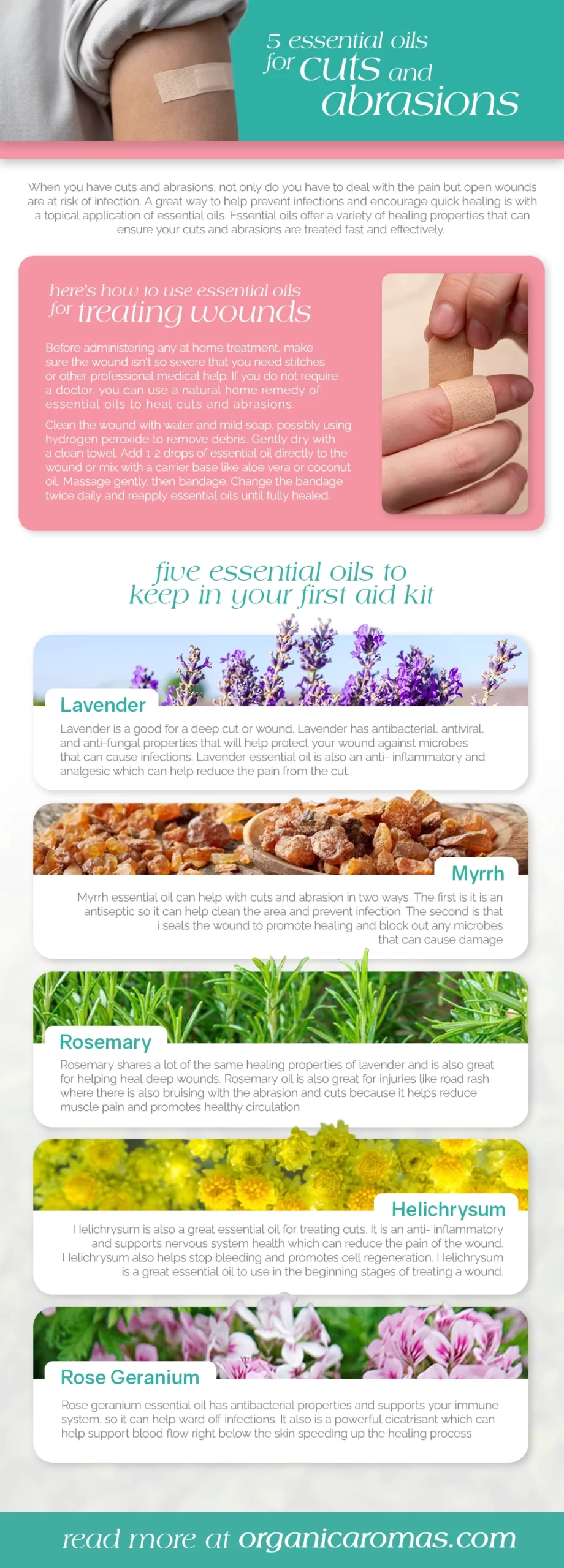
10 Benefits of Using Essential Oils for Cuts and Wounds
Natural Antiseptic: Certain essential oils like tea tree oil have antiseptic properties that can help to prevent infection in cuts and wounds .
Promotes Healing: Lavender oil is known to speed up the healing of cuts, burns, and wounds by improving blood circulation .
Reduces Inflammation: Chamomile oil has anti-inflammatory properties which can help reduce swelling and redness around the wound .
Pain Relief: Eucalyptus oil and peppermint oil are natural analgesics, providing relief from pain .
Minimizes Scarring: Helichrysum oil is believed to reduce the appearance of scars and promote skin regeneration .
Antibacterial Properties: Oregano oil is potent against a range of bacteria, helping to prevent infected wounds .
Soothes Skin: Essential oils like lavender and chamomile can soothe irritated or damaged skin, promoting comfort for the wounded area .
Boosts Immune Response: Frankincense oil is known to boost the immune system which can aid in faster healing .
Antifungal Properties: Essential oils such as tea tree and oregano oil have antifungal properties that can prevent fungal infections in wounds.
Reduces Stress and Anxiety: The aromatic and calming properties of essential oils can help reduce stress and anxiety which can indirectly aid in the healing.
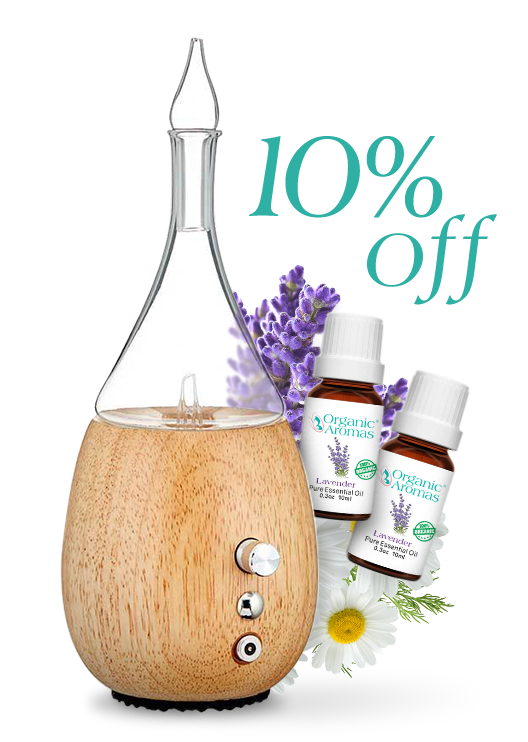
Join Now and Get a Coupon for 10% Off!
The Best Carrier Oils for Cuts And Wounds
Choosing the right carrier oil for cuts and abrasions is crucial because it can enhance the healing properties of the essential oils you are using. Here are some of the best carrier oils for this purpose:
Coconut Oil: This oil has antimicrobial properties, which can help prevent infection. It’s also deeply moisturizing, which can keep skin healthy during the healing process.
Jojoba Oil: Jojoba oil closely resembles the skin’s natural sebum, making it an excellent moisturizer. It’s also rich in vitamins E and B, which can aid in skin repair.
Sweet Almond Oil: Packed with vitamin E, sweet almond oil can promote skin health and speed up wound healing. Its anti-inflammatory properties can also reduce swelling around the wound.
Olive Oil: Olive oil has been used for centuries in wound care due to its rich antioxidant content and anti-inflammatory properties. It’s also a good moisturizer.
Grapeseed Oil: Grapeseed oil is light and easily absorbed by the skin. It’s rich in antioxidants and omega-6 fatty acids, which can assist in skin repair.
Argan Oil: Known for its many wound healing properties, argan oil is rich in vitamin E and essential fatty acids, making it a great choice for wound care .
Rosehip Oil: Rosehip oil is known for its skin regeneration properties, which can be beneficial for wound healing. It’s also packed with vitamins A and C, which can stimulate collagen production.
The Importance of Pure Essential Oils
These oils are powerful in helping treat cuts and abrasions; however you have to make sure that when you are using essential oils for their healing properties you are using 100% pure oil extracted from the plants. Some essential oils are just perfume oils that use synthetic chemicals and carrier oils in a blend to mimic essential oils.
These do not provide any real healing properties and can actually irritate the skin when applied topically. So make sure that when building your essential oil first aid kit you use real essential oils like those found at Organic Aromas. Our oils are made of 100% natural, organic plant sources and provide the full healing benefit for cuts and abrasions. Check out our wide selection of essential oils and experience for yourself the impressive healing powers of essential oils.
In Closing
Essential oils have proven to be an effective alternative for the treatment of cuts and abrasions. Their natural antiseptic, antibacterial, and anti-inflammatory properties make them ideal for promoting wound healing and preventing infections.
The soothing nature of these oils can also provide relief from pain and discomfort. Essential oils like lavender, tea tree, and chamomile are particularly beneficial due to their unique healing properties.
However, it’s vital to remember that while essential oils can aid in the healing process, severe or deep wounds should always be treated by a medical professional.
Always dilute essential oils with a carrier oil before topical application to avoid skin irritation.
Despite these precautions, the use of essential oils for minor cuts and abrasions is an effective, natural and holistic approach to wound care.
Frequently Asked Questions
1. What are the best essential oils for treating cuts and abrasions?
Lavender, tea tree, and chamomile oils are highly recommended for their antiseptic, anti-inflammatory, and healing properties. These oils can help reduce the risk of infection and promote faster healing.
2. How do I apply essential oils to cuts and abrasions?
Always dilute essential oils with a carrier oil such as coconut or jojoba oil before applying to the skin. Use a clean cotton swab or a sterile gauze pad to gently dab the diluted oil onto the affected area.
3. Are there any essential oils that should be avoided on open wounds?
Yes, some essential oils can be too harsh for open wounds. Avoid using oils like cinnamon, clove, and oregano directly on cuts and abrasions, as they can cause irritation.
4. Can essential oils help reduce scarring from cuts and abrasions?
Helichrysum and frankincense oils are known for their ability to support skin regeneration and may help reduce the appearance of scars. Remember to continue using these oils even after the wound has healed for best results.
5. How often should I apply essential oils to a wound?
For minor cuts and abrasions, applying essential oils 2-3 times a day can be beneficial. Always observe how your skin reacts and adjust frequency accordingly.

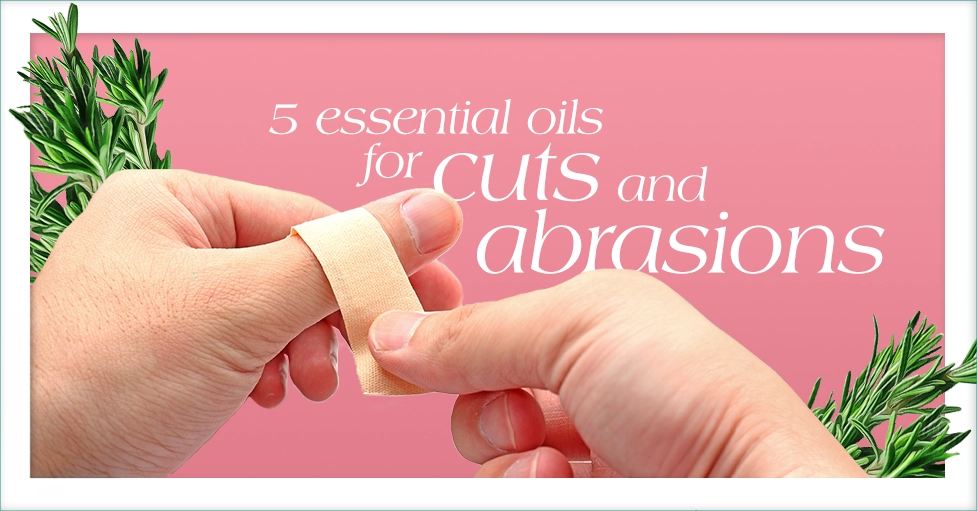
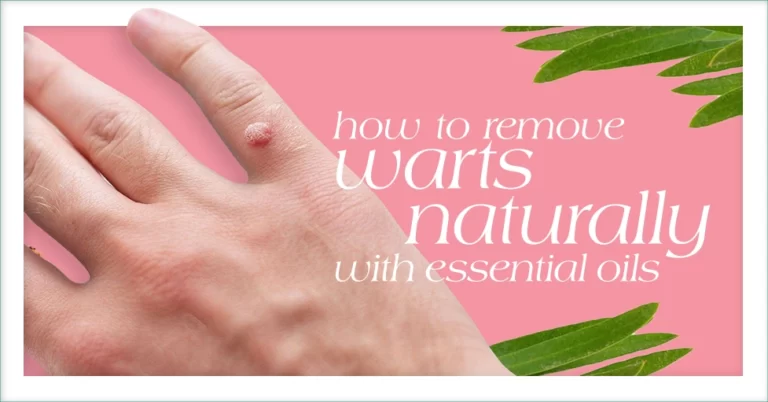
For problems with blood flow circulation and non healing wounds, diabetic neuropathy everybody MUST seek Sir Arnold Takemoto of BioImmune in Scottsdale, Az. I cannot begin to explain how effective his neutraceutical products are to treat even the worst cases of progresses diabetic neuro. Top guy in the world thru clinical outcomes- million miles ahead of the rest period !!!!!!
Great post! Thanks for sharing.
My fiance has a wound in his foot, the heel area that has progressively gotten worse. Not only is there the deep hole into his foot that won’t heal even with antibiotics but now Moving up his leg to about midshin his leg has edema and his skin is red and dry and painful like a sunburn. The hole in his heel side feels differently than the radiating pain above it up to midshin level. To shorten it up he won’t let me tounch it at all. So I can’t try the oils if I must run them on. Would dropping some on it be a way to detour around that? And if so can too much be used? Thanks, hopefully awaiting your response. , Carrie
I just had a area on my nose basal cell cancer removed what oil can I use to aid with healing and lessen scaring
Please add the scientific names when talking about essential oils! The info is kind of useless without it! Other than that, good article! I just wish I knew specifically what oils you were talking about..
There are too many that go by similar common names
i have shingles, what essential oil should I use and how, I assume with a carrier oil. thanks for the help
Maxine
Great information. It was very helpful. Levender oil is more effective. Because Lavenders oil has Anti-septic properties and its regenerative abilities. It is great for most skin disorders, along with cuts, scrapes, burns, bumps and bruises.
TagBand USA
Informative article, thank you. I will supplement my supply with the two missing oils; myrrh and helichrysum
Still, treasuring my Radiance nebulizing diffuser.
I have never used essentilal oil before. I never knew the health benefits until now.
I use lavender on cuts and they heal much quicker. Was unaware of a couple of these.
I appreciate knowing I can add a few drops to a carrier oil. Thanks for teaching me something new!
Love your products!
Thanks for the info. Never would have thought of using EO for cuts.
Great information. Thank you for sharing.
Very useful info! Thanks for sharing the wonders of these essential oils!
I never thought about EO for cuts, I will have to add them to the first aid kit
Thank you for the info. I’m loving these essential oils!!
Great information. I was unfamiliar with Helichrysum and its uses before now.
I love lavender. It has so many uses for this oil. Thanks for all the info.
I have great result with lavender. I would like to have one day helicrysum.
This was a very helpful and informative article.
Glad to add to my knowledge base. I use tea tree oil in brushing my teeth for gum health.
Such great information. Thank you for sharing.
Thank you for the informative article!
I didn’t know anything about Helichrysum oil. Thanks for all of the info about the oils and abrasions. But I think I might try mixing some Helichrysum oil with the coconut oil I already use as a moisturizer to see what effects the skin regeneration properties might have. Thanks!
Thanks for the info. I knew I could use essential oils for wounds but I have a hard time remember which ones so thanks for the reminder.
I have had amazing results using lavender and helichrysum on wounds and burns. Lavender completely healed a scalding burn with repeat application and helichrysum is amazing in its ability to promote new tissue without scarring.
Thanks for the information i never knew that you could use the oils for that purpose.
The use of essential oils has diminished with modern medicine. Centuries ago the uses were more common.
Good information. I will try these suggestions.
Great info. Thanks!
Can never have to many resources in my first aid kit.
I was wondering what Myrrh was good for – thank you!
I really like Raindrop Nebulizing Diffuser and it would be nice to use in my home. I heard that is very good. Anyway, you have great essential oils!
Ill stick with neosporin, thanks.
Thanks for the information, Lavender is so good for so many things.
As always, thanks for great information. I would use a base oil like coconut, which is also antibacterial.
Great information for a woman living with all boys. They cut themselves often! First aid is something I have to deal with all the time and this is great to know for extra benefits outside of the normal kit.
Very informative and useful info, thank you! Easy to remember too since I use lavender and rosemary all the time.
I am just learning about the benefits of oils and their uses.
This information will come in handy next time one of us accidentally gets cut or scraped up.
Very informative. Lavender and Rosemary are staples for my Nebulizer. I didn’t realize that they would be helpful for minor cuts as well.
Hello, thank you for the great information on using these oils for first aid. I am particularly interested in using Myrrh oil now for some smaller cuts I have and desire healing.